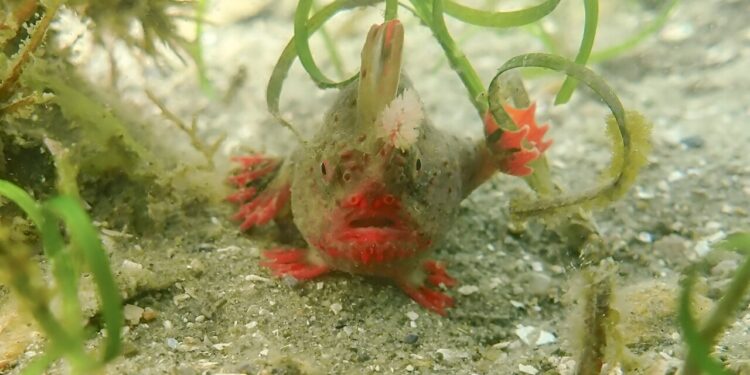Scientists have captured 25 extremely rare redhandfish from the ocean off Australia, hoping to protect the struggling species from warming seas and other threats.
Scientists have collected 25 extremely rare redhandfish from the ocean off Australia, hoping to protect the struggling species from warming seas, human-caused habitat changes and voracious sea urchins.
Only about 100 goldfish, which have the appearance of a crimson and brown goldfish with stubby arms and webbed hands, are left in the wild, living in a small part of the reef in southeast Tasmania .
About eight centimeters (three inches) long, they “walk” along the seafloor on their pectoral and pelvic fins rather than swimming.
But overgrazing of sea urchins, runoff from urban areas, disturbance from boats and rising sea temperatures have led to “serious habitat loss and degradation,” according to the Institute for Marine Studies and Antarctic Studies from the University of Tasmania.
Institute scientists recently made the difficult and risky decision to remove dozens of fish from the wild to safety.
“This summer has already far exceeded previous maximum temperatures,” said marine scientist Jemina Stuart-Smith.
“We can only assume that this additional stressor will have an impact on an already fragile population,” she said.
On Wednesday, scientists said all 25 specimens were doing well in their temporary aquarium and were being closely monitored for stress or ill health.
Scientists at the Institute for Marine and Antarctic Studies made the difficult and risky decision to remove dozens of fish from the wild to bring them to safety.
“We have very experienced staff looking after the fish seven days a week and a 24-hour response team,” said Andrew Trotter of the institute.
“We believe they are safe with us, but there is certainly an increased sense of responsibility within our team, given the small size of the wild population.”
Trotter and his colleagues hope to return the fish to their natural habitat when temperatures drop with the onset of the southern winter in June.
Sea temperatures off Australia have been steadily increasing since records began in the early 1900s.
Experts believe this change is fueled by emissions of carbon dioxide and other greenhouse gases into the atmosphere.
© 2024 AFP
Quote: Australian scientists harvest rare handfish from ocean due to climate risk (January 31, 2024) retrieved January 31, 2024 from
This document is subject to copyright. Except for fair use for private study or research purposes, no part may be reproduced without written permission. The content is provided for information only.



